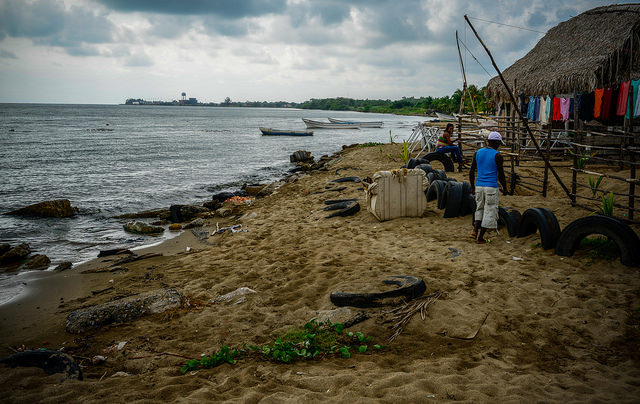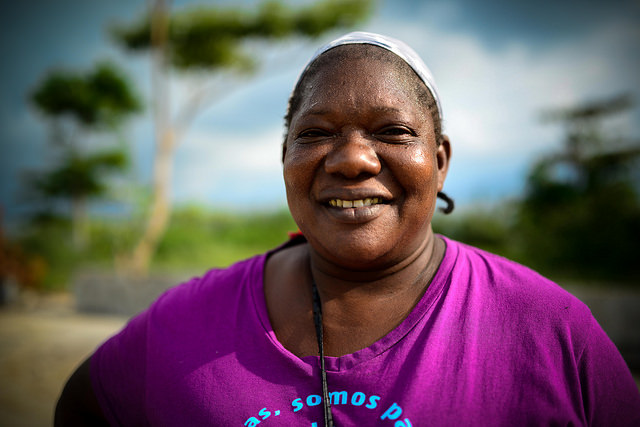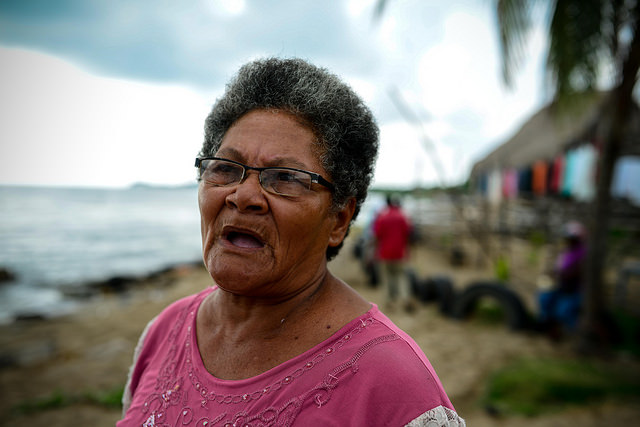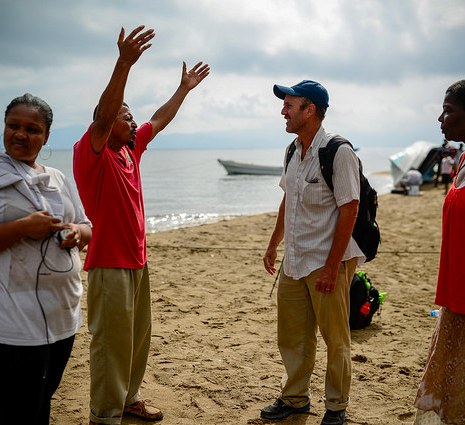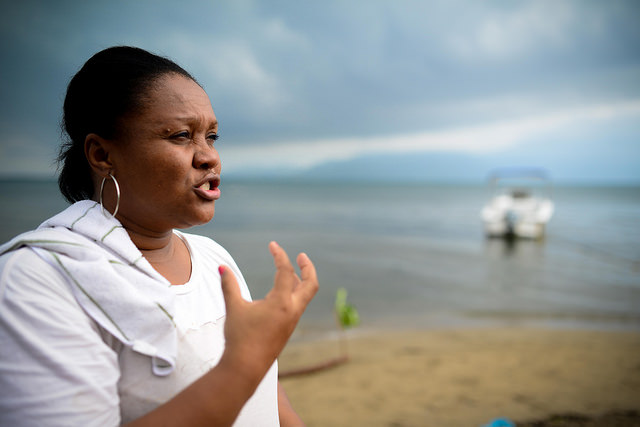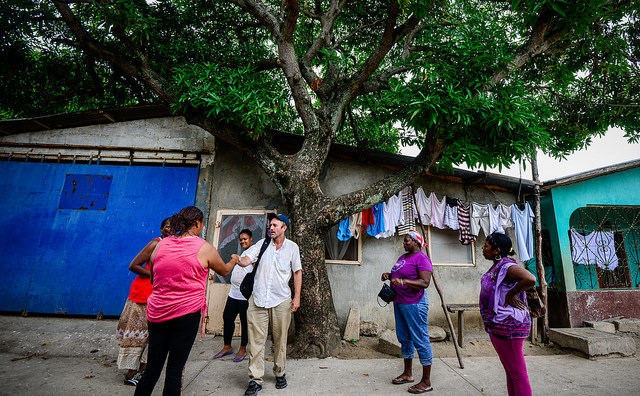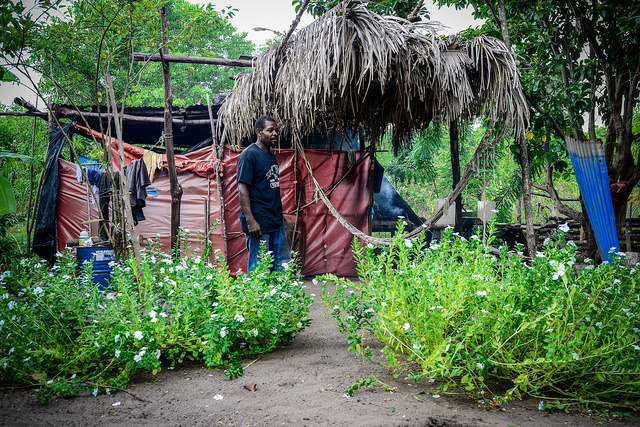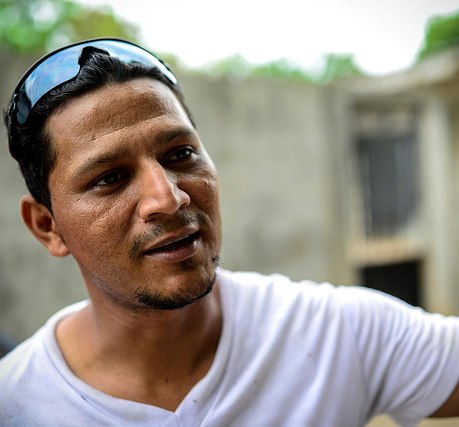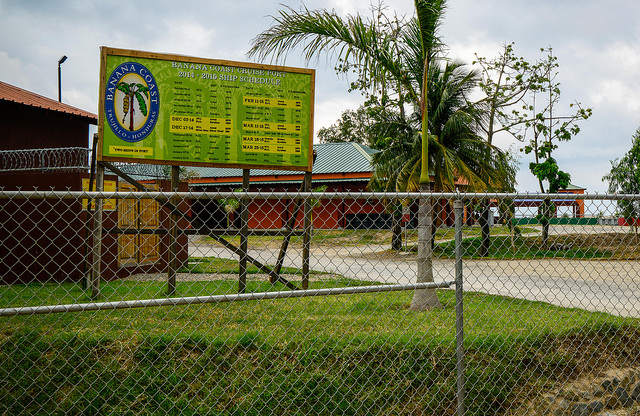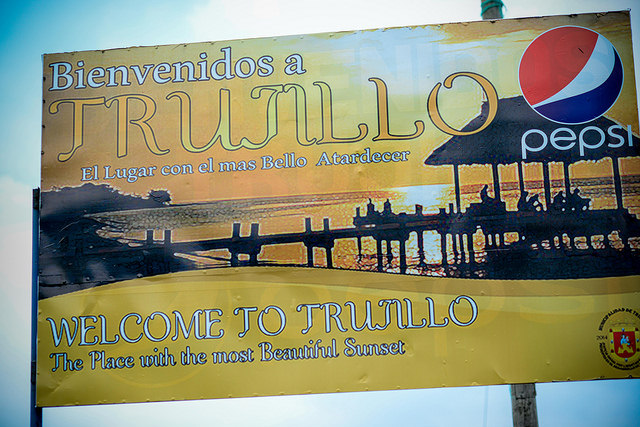Ag Missions’ Honduras Delegation Journal October 23-24, 2014
Part IV: Garifuna communities in Trujillo and Puerto Castillo endure collective displacement, fisheries contamination, threats to fresh water.
Photos in this post by Steve Pavey
This photo shows the Port of Castillo in the distance, lands taken from Garifuna in the 80s who were forced to relocate to their current overcrowded location. A naval base was also established in the Port area. These facilities have contaminated the surrounding waters with toxic chemicals, causing a decrease in the health of the surrounding fisheries.
The towns of Trujillo and Puerto Castillo are in the heart of Garifuna territories on the Northern Honduran coast. OFRANEH has been in a long term relationship of solidarity with these communities, whose ancestral territories encompass large swaths of this geographically significant peninsula with a sweeping northern point that shelters a very large bay and to the west of the peninsula a very large freshwater lagoon to the east.
OFRANEH leader from Trujillo, Carmen Blanco.
Betty was among those forced to leave her home in Cristales when the Port Authority forced them out, and confirms that the overcrowding and marginalization in Puerto Castillo are difficult to endure. Betty said: “If we had known then what we do now, we never would have allowed them to make us leave.”
Our delegation heard from the local leaders of Puerto Castillo, who laid out their history of displacement, and their current faceoff with local authorities over issues of overcrowding, economic marginalization and threats to their freshwater supply. These grievances led to a firm but peaceful protest and road blockade that was violently repressed this past May. (to see video of this police action that imperiled the residents of Puerto Castillo, go to: http://www.youtube.com/watch?v=eVKU6PM2rEU )
We saw a Persian window broken by a tear gas bomb as the peaceful protest was violently repressed. An infant less than 1 year old and many other small children were nearly asphyxiated by tear gas bombs shot into peoples’ homes, as the police rampaged into the town. The residents evacuated the affected children to a boat in the bay. A witness recounted to us: “We told the police to stop firing the tear gas, that infants were being asphyxiated. “ One of the soldiers replied: “Let them drown.”
One of the leaders of the Water Board of Puerto Castillo explained that their water supply comes from springs located in far off mountains we could see across the large bay, and delivered through pipes that were built by the United Fruit Company, a system they had built for their own operations (aka during the making of the Banana Republic of Honduras that took over prime lands for banana production). As part of the deal when United Fruit finally left the area, the water system was turned over to the local people, which provided them with safe water for decades. For the past decades, this water has served the people of Puerto Castillo and also the Port and Naval Base, who never paid a penny for their access to this community water supply. However, recently the water supply has been irregular, partly due to dry spells, but also due to damage being done to the springs and the water tubes there, as the municipality of Trujillo does construction work to build a sewage system for the urban dwellers there. Extensive damage was done to the water pipes at the source due to this construction work, and Puerto Castillo experienced 3 full days with no fresh water at all. The people were extremely angry at this threat to their lives in this community.
Puerto Castillo leader of the Water Board, daughter of former President of the Local Council and public school teacher.
When the Garifuna communities of Cristales were displaced by the Port Authority to build the Deep Water Port, they were relocated into what is today Puerto Castillo town. There the wooden houses were built in tight lines with no space for gardens, trees, etc… a very different situation from their previous community that provided ample room, including for agricultural production.
Puerto Castillo town suffers from overcrowding, lack of space for gardens, economic privation, threats to their water supply and now violent repression when they protest these conditions.
The people of Puerto Castillo therefore are demanding the right to expand their community to lands that were considered to be ancestral Garifuna lands to the south of the town of Puerto Castillo. However, private interests have interceded and have used legal maneuvers and police raids to cut off the community access to adjacent lands. Homes built on those claimed lands have been destroyed on several occasions by authorities. We met this man who due to lack of land is now squatting on the roadside opposite lands the road from lands the community have claimed.
Squatter on roadside outside of Puerto Castillo.
The President of the Patronato of Puerto Castillo (see photo below) confirmed these issues with us and asked for our solidarity. He decried the use of police forces using tear gas as an offensive weapon and rubber bullets and larger projectiles in the violent repression of the town. He said the community had tried all procedural means to improve their situation and what was left to them was to block the road leading to the Port, which triggered the violent repression.
President of the Patronato of Puerto Castillo, a very articulate, warm and friendly young man.
See this link for a photo of police repression: http://www.laprensa.hn/honduras/regionales/711018-286/desalojan-a-pobladores-en-toma-de-carretera-a-puerto-de-castilla
Meanwhile, back in Trujillo itself at the foot of the peninsula, we saw the results of the Banana Coast tourist enterprise developed by the Randy Jorgensen, known as the “Porn King” of Canada. The Banana Coast company managed to displace an entire Garifuna community that lived in the center of Trujillo, through pressure and buying out local people’s plots.
A large area in the downtown area of Trujillo and many hopes were displaced by this Canadian “investor” where Cruise Ships now drop off tourists who are bused away to his private facility, leaving almost no trickle down to the local economy.
So in the name of “development” “progress” and in line with the slogan coined for Honduras by successor governments of the 2009 coup, Honduras is: “open for business.” The wealthy elite that overthrew the democratically elected government of Mel Zelaya are in collaboration with foreign investors who encroach upon Garifuna and other indigenous peoples’ and campesino community lands. One result: local struggles to preserve the necessities of life such as water and enough space to live in, such as that struggle of the people of Puerto Castillo are violently crushed.
Before you take your next tourist trip, you just might ask yourself… “ Hmmm, I wonder what lies behind the benign message of this billboard?” Who could know that a “Porn King” and displacement of peoples lay behind that?
All photos in this post by Steve Pavey.
